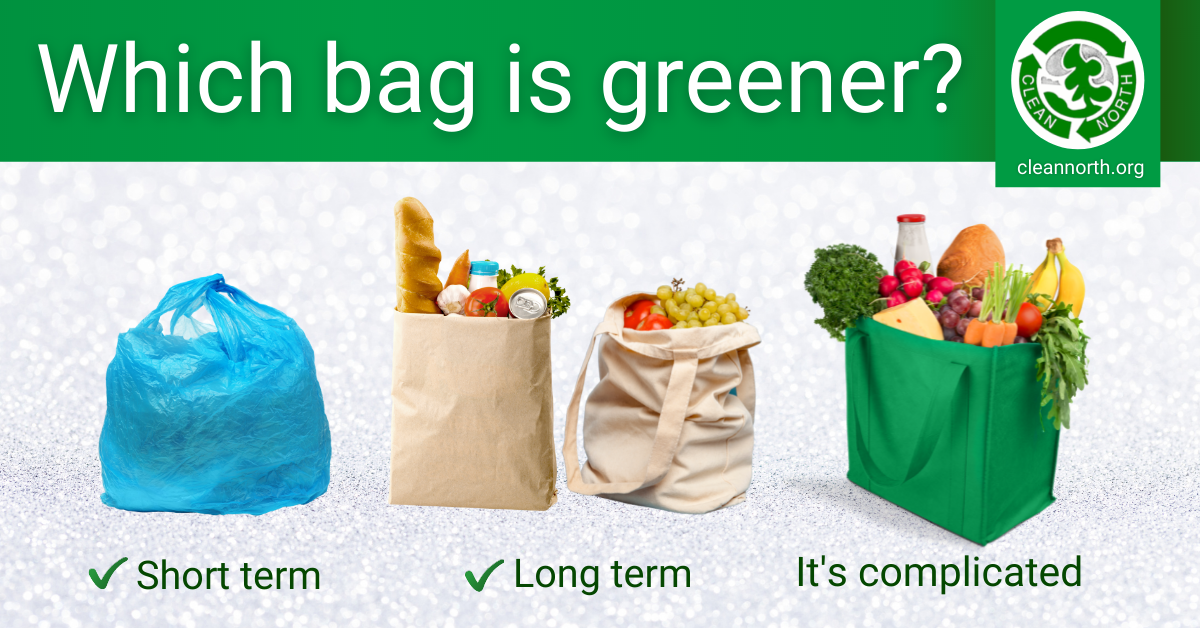
What happens when single-use bags are banned? It depends on what we use instead. Let’s look at the pros and cons of alternatives and make informed choices that truly protect people, wildlife, and the environment.
Single-use plastic
Surprising to some, these bags have the least environmental impact (greenhouse gas emissions, waste, pollution) in the short term. They are very lightweight so take relatively little energy to ship. They also have a high rate of reuse — as trash can liners, for pet waste, etc.
However, while they can be recycled, many recycling plants don’t want them because they gum up machinery. Our local recycling facility does not accept plastic bags.
And these bags pose a serious risk to people and ecosystems when they get into the environment — they can ensnare wildlife and break down into microplastics that get into our soil, water, and food (even human placentas!).
The good news about plastic carrier bags is they have a high rate of reuse to line wastebaskets, as pet waste bags, etc. You can also donate them to a locally owned thrift store such as Helping Hands, St. Vincent Place, or the Bargain Box.
Paper
Many retailers are replacing single-use plastic bags with brown paper bags. However, the paper ones are not totally green either. They generate much higher greenhouse gas emissions during manufacture/shipping than single-use plastic ones do. Paper making also involves heavy use of toxic chemicals. And while you can reuse these bags (including as giftwrap!), many people don’t. Paper bags also tear easily.
On the up side, these bags are easy to recycle/compost, with no risk to wildlife or ecosystems. And if made in Canada, they support our northern and rural economy.
Reusable plastic
Reusable plastic bags have the same down sides as single-use plastic bags — they persist for centuries and eventually break down into microplastics. In addition, they must be reused many times for their environmental impact to be less than single-use plastic bags. They vary a lot in weight and sturdiness; the heavy-duty ones take more energy and space to ship. The non-woven polyproylene ones (like the green Dollarama ones) are lightweight so take less energy to ship. And they make an excellent filter layer in homemade face masks!
Reusable bags can carry germs such as E. coli. They are washable but are rarely washed, and washing plastic ones can leach microplastics into waste water.
If you already own a bunch of these, the greenest option is to keep using them as long as possible. And consider donating surplus reusable bags to local thrift stores or Community Living Algoma (phone first to confirm).
Reusable cotton
Cotton is natural, so it must be green, right? Actually, not so much. Growing cotton requires huge areas of land, water, fertilizers, and pesticides. Organic cotton takes even more land and water to grow. And cotton bags can be heavy and bulky so have a relatively heavy shipping footprint. They must be reused many times to be greener than single-use plastic bags.
On the flip side, cotton bags can be composted (avoid composting ones with coloured dyes that could be toxic or ones that have plastic decorations). Cotton bags pose minimal risk to wildlife or ecosystems if they get into the environment. As with any reusable bag, they can can carry bacteria and viruses so wash regularly.
The bottom line
No easy answers! Your best bet is to reuse whatever bags you already own as many times as possible, refuse bags whenever possible — and buy less stuff. You can also buy secondhand reusable shopping bags at thrift stores, helping to reduce demand for new ones, or make bags out of old sheets.
And remember, if you start buying plastic trash bags for your small wastebaskets or special scoop bags for pet waste, you’re undoing the ban’s objective. Consider saving and reusing pet food bags and milk, frozen fruit, and bread bags.
Want to learn more?
- Why a plastic bag ban could lead to unintended environmental consequences
- Environmental and economic highlights of the results of the life cycle assessment of shopping bags
- Paper, plastic, or reusable? The answer is a mixed bag
- Sustainable shopping—which bag is best?
- Plastic, paper or cotton: Which shopping bag is best?




